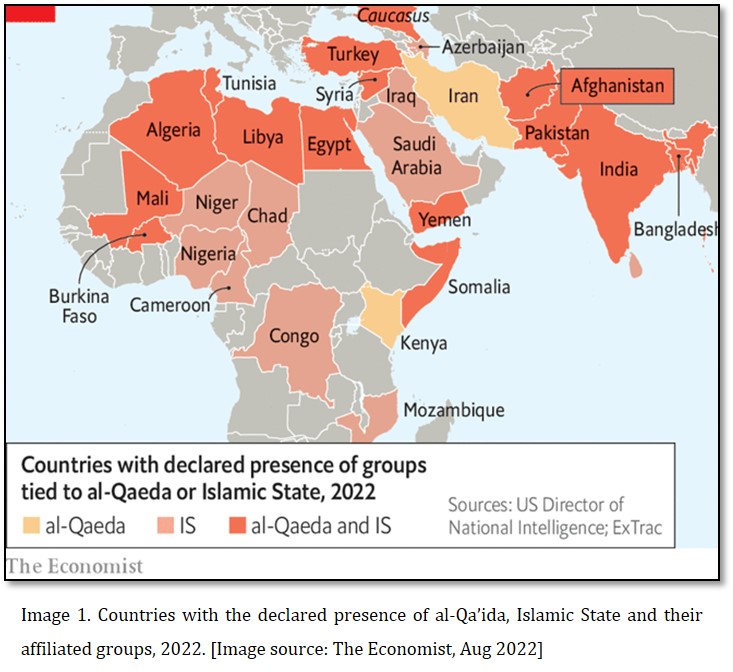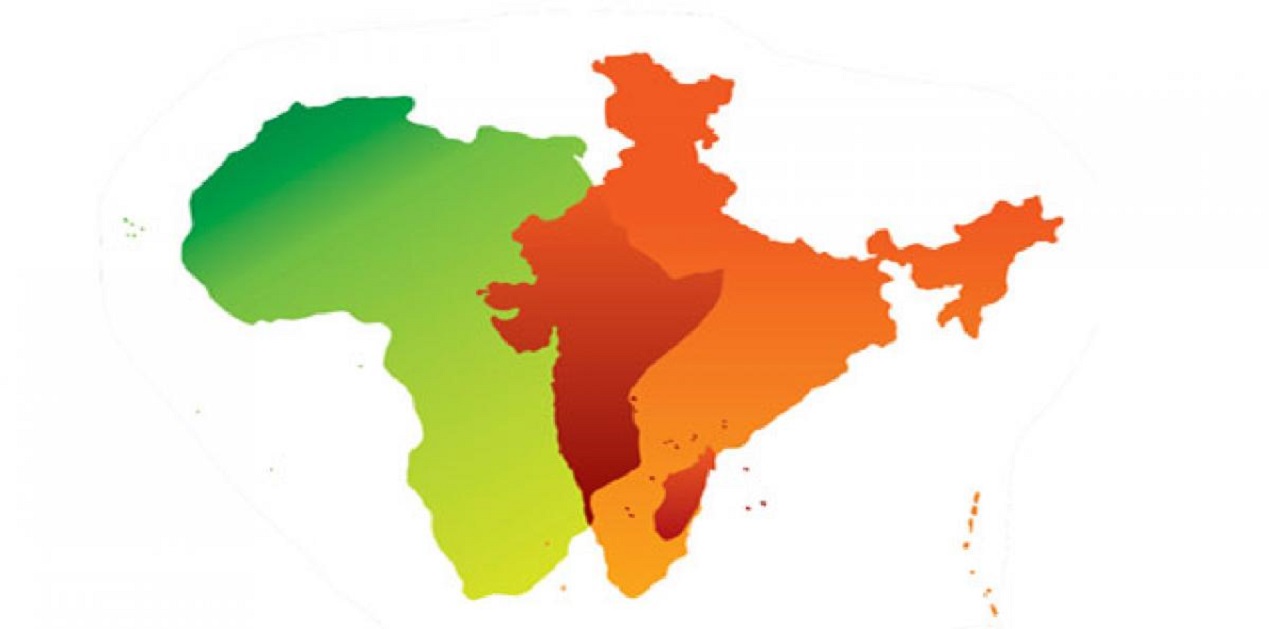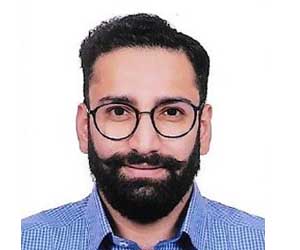“We are very conscious of the expanding threats posed by radicalism, fundamentalism, and terrorism to African societies. These have been the subject of our contemporary agenda of cooperation.”
Peace and security have always been part of the priorities in India and Africa relations. Along with other African nations and under the UN Peacekeeping Charter, India continues to participate in almost every peacekeeping and anti-piracy operation in various African countries. During India-Africa Defence Ministers’ Conclave held on 06 February 2020 in Lucknow, Uttar Pradesh, India, both sides mutually expressed their wish to counter-terrorism and strengthen the existing United Nations’ mechanisms against terrorism. As of now, India is indirectly cooperating with African countries on countering terrorism. From setting up of Defence Colleges and other related establishments— to the deployment of training teams and hosting of India-Africa Field Training Exercises (AFINDEX), India has been involved in sharing defence experiences and helping build African nations’ defence capabilities, which may also be utilised in countering the terrorist threat. However, India must visibly contribute to counter-terrorism capacity building to strengthen counter-terrorism cooperation with Africa.
Trends of Terrorism in Africa
After Asia, the African continent is the world's second-largest and most populous. The continent is home to 54 fully recognised nations and two de-facto states— the Sahrawi Arab Democratic Republic and Somaliland, both of which have limited or no international recognition. Terrorism in Africa has evolved as geopolitical events laid the groundwork for Islamic jihadi groups to thrive and carry out operations. The section will discuss significant changes in security scenarios in Sub-Saharan Africa.

The Sahel region, Somalia, Chad, and Nigeria were the three central locations in Sub-Saharan Africa where the Islamic terror groups operated. Somalia continues to be plagued by terrorism spreading to Kenya, Mozambique, and the Democratic Republic of the Congo. Islamic jihadist organisations have carried out numerous terrorist attacks in West Africa's Sahel region, which borders Mali, Niger, and Burkina Faso. The Sahel, which stretches south of the Sahara desert, is becoming a terrorism hotspot as the Islamic State (IS) seeks to expand and establish a foothold in the region. It is the 'home turf' of Jamaat Nasr al-Islam wal-Muslimin (JNIM), an al-Qa’ida-affiliated coalition. Because of the country's political unrest, rampant corruption, and weak military, the Islamic State (IS) and other jihadist organisations can thrive in Mali. According to estimates, nearly 2,700 people were killed in a conflict in the first six months of 2022, which is nearly 40% more than in 2021.[2]

According to the Global Terrorism Index 2022 study, five African nations—Somalia (ranked third), Burkina Faso (ranked fourth), Nigeria (ranked sixth), Mali (ranked seventh), and Niger (ranked eighth)—made it into the list of top 10 countries most impacted by terrorism in 2021.[3] Three coordinated strikes by terrorists from the Islamic State West Africa Province (ISWAP) on March 21, 2021, in the Tahoua region of Niger resulted in the deaths of 137 civilians.[4] The year 2021 was the first in recent history in which Niger suffered many casualties due to terrorist attacks carried out by the Islamic State in the Greater Sahara (ISGS) and Boko Haram almost every month.
The region’s deadliest terrorist groups are Boko Haram, al-Shabaab, Jamaat Nasr al-Islam wal-Muslimin (JNIM), IS-affiliated—ISWAP, and Islamic State in the Greater Sahara (ISGS). After the 'reported' death of Boko Haram’s leader— Abubakar Shekau, in May 2021 and the subsequent defection of its members to ISWAP, it is quite possible that Boko Haram would fall. Boko Haram and its presence in neighbouring nations, including Mali, Cameroon, and Niger, have been exceeded by the ISWAP, an affiliate of the Islamic State (IS), in Nigeria.
Until early 2022, France has been heavily involved in Africa's counter-terrorism (CT) efforts for a long time. Over the last seven years, France-led military operations such as Operation Barkhane have been effective but far from complete against Islamic extremist groups such as al-Qa'ida and the Islamic State in the Greater Sahara (ISGS). According to the Global Terrorism Index 2022 report analysis, terror groups such as JNIM have taken advantage of the Sahel region's political grievances, lack of economic opportunities, and other social conditions.[5] The repeated coups in the Sahel, primarily in Mali, do not promote regional stability. Mali has experienced three military coups in the last eight years (2012, 2021, and 2022), highlighting the government's inability to combat terrorism. Since the start of France's CT operations, over 100,000 West Africans have died, over a million have been displaced, and both West African and French security forces have suffered heavy losses.[6] Given the loss of its troops, the cost of fighting Islamic terror groups, and unpopularity among Mali's government and public, French President Emmanuel Macron announced the withdrawal of French and allied troops from the country in February 2022.[7] As a result, Mali would suffer from France's exit, and neighbouring countries' security will be jeopardised.
The overall terrorism situation in Africa is primarily rooted in dissatisfaction in society— unemployment, lack of governance, law and order, and political instability. Therefore, terrorism in Africa is not only religiously inspired but also politically motivated.[8] Due to aforementioned reasons, the local jihadi groups find progression in allegiances with transnational terrorist organisations— al-Qa’ida and Islamic State.
Way Forward for India’s Cooperation
On 17 May 2022, India’s External Affairs Minister (EAM), Dr Subrahmanyam Jaishankar, said, "India has been cooperating with African nations to counter the expanding threats posed to their societies by radicalism and terrorism. These areas have been contemporary agenda of cooperation.”[9]
Two significant initiatives over the past few years have helped to strengthen ties between India and Africa: the first was the Africa-India Field Training Exercise (AFINDEX), which took place in March 2019 in Pune, Maharashtra, and was attended by contingents from 17 different African countries; the second was the India-Africa Defence Ministers' Conclave (IADMC), which took place in Lucknow in February 2020. In the areas of defence and peacekeeping in Africa, India has been actively involved. India has aided in establishing military colleges and academies in Nigeria, Ethiopia, and Tanzania. It has also sent training teams to Botswana, Namibia, Uganda, Lesotho, Zambia, Mauritius, Seychelles, Tanzania, and other African countries. Aside from establishing defence facilities, the Indian armed forces have provided humanitarian aid and disaster relief in numerous tragic events, such as Cyclone IDAI in Mozambique in 2019 and numerous rescue operations over the years. India may consider exporting SAMS (Surface-to-Air Missile System), LCA (Light Combat Aircraft) Tejas, light guns, and ammunition to boost defence ties further. This will increase both the demand for Indian defence equipment in Africa and the ability of African countries to conduct successful counter-terrorism operations.
Along with the 12th edition of DefExpo from 18-22 October 2022, India hosted the 2nd edition of the India-Africa Defence Dialogue (IADD) on 18 October 2022 in Gandhinagar, Gujarat, India, with the theme ‘India-Africa: Adopting Strategy for Synergising Defence and Security Cooperation.’ In the dialogue, 50 African nations participated, including 20 Defence Ministers, 07 Chief Defence of Staff (CDS)/Service Chiefs, and 08 Permanent Secretaries. The IADD centred on the fundamental determination of India and African nations to explore new points of convergence for defence engagements, such as capacity building, training, cyber security, maritime security, and counter-terrorism.[10] Rajnath Singh, India's Raksha Mantri (Defense Minister), stated in his address that—
“India remains united with African countries in their pursuit of peace, security, stability, growth, and prosperity. India will continue to strengthen and deepen its ties with Africa. Apart from the goals of development, commercial, and technological partnerships, The India-Africa partnership will also include collaboration to strengthen counter-terrorism and extremism capabilities, as well as support for United Nations (UN) peacekeeping missions.”[11]
With vast experience in dealing with cross-border/proxy terrorism and insurgency within the country, India can contribute to building the capabilities of security agencies in Africa. There is a scope for India-Africa to cooperate in intelligence, investigation, and prosecution of terrorism-related incidents, with the mutual goal of combating terrorism.
Endnotes :
[1]Jaishankar, Dr S. “Address by External Affairs Minister, Dr S Jaishankar at the launch of book: India-Africa Relations: Changing Horizons”, Ministry of External Affairs, 17 May 2022, accessed on 26 September 2022, available from: https://mea.gov.in/Speeches-Statements.htm?dtl/35322/Address_by_External_Affairs_Minister_Dr_S_Jaishankar_at_the_Launch_of_Book_IndiaAfrica_Relations_Changing_Horizons
[2] “How al-Qaeda and Islamic State are digging into Africa”, The Economist, 11 August 2022, accessed on 26 September 2022, available from: https://www.economist.com/middle-east-and-africa/2022/08/11/how-al-qaeda-and-islamic-state-are-digging-into-africa
[3]Institute for Economics and Peace. “Global Terrorism Index 2022: Measuring the Impact of Terrorism”, Sydney: March 2022. accessed on 24 September 2022, available from: http://visionofhumanity.org/resources
[4]Sharma, Anurag. “Global Terrorism Trends in 2021 & Projections for 2022”, Vivekananda International Foundation, 12 April 2022, accessed on 25 September 2022, available from: https://www.vifindia.org/article/2022/april/12/global-terrorism-trends-in-2021%20#_ednref8; “Niger Suffers deadliest raids by suspected Jihadists,” BBC News, 23 March 2021, accessed on 25 September 2022, available from: https://www.bbc.com/news/world-africa-56497164 .
[5]Institute for Economics and Peace. “Global Terrorism Index 2022: Measuring the Impact of Terrorism”, Sydney: March 2022. accessed on 24 September 2022, available from: http://visionofhumanity.org/resources
[6]Maclean, Ruth, and Finbarr O’Reilly. “Crisis in the Sahel becoming France’s forever war”, The New York Times, 29 March 2020. Accessed on 24 September 2022, available from: https://www.nytimes.com/2020/03/29/world/africa/france-sahel-west-africa-.html
[7] “Macron announces French troop withdrawal from Mali”, France 24, 17 February 2022, accessed on 25 September 2022, available from: https://www.france24.com/en/france/20220217-live-macron-holds-conference-on-sahel-engagement-as-france-poised-to-withdraw-troops-from-mali
[8] Institute for Economics and Peace. “Global Terrorism Index 2022: Measuring the Impact of Terrorism”, Sydney: March 2022. accessed on 24 September 2022, available from: http://visionofhumanity.org/resources ;
Anant, Arpita, “Scope for India-Africa Cooperation in Countering Terrorism”, Manohar Parrikar Institute For Defence Studies And Analyses, January-March 2021, accessed on 24 September 2022, available from: https://idsa.in/africatrends/Scope-for-India-Africa-Cooperation-10-1-2022
[9]Jaishankar, Dr S. “Address by External Affairs Minister, Dr S Jaishankar at the launch of book: India-Africa Relations: Changing Horizons”.
[10] “India-Africa Defence Dialogue held on the sidelines of DefExpo 2022 in Gandhinagar, Gujarat; paves way for strengthening of India-Africa defence relations”, Press Information Bureau- Ministry of Defence, 18 October 2022, accessed on 25 October 2022, available from: https://pib.gov.in/PressReleasePage.aspx?PRID=1868820
[11] “DefExpo 2022”, Directorate of Public Relations- Ministry of Defence, 19 October 2022, accessed on 25 October 2022, available from: https://defexpo.gov.in/upload/DefExpo-Day01.pdf; “India-Africa Defence Dialogue held on the sidelines of DefExpo 2022 in Gandhinagar, Gujarat; paves way for strengthening of India-Africa defence relations”, Press Information Bureau- Ministry of Defence.
(The paper is the author’s individual scholastic articulation. The author certifies that the article/paper is original in content, unpublished and it has not been submitted for publication/web upload elsewhere, and that the facts and figures quoted are duly referenced, as needed, and are believed to be correct). (The paper does not necessarily represent the organisational stance... More >>
Image Source: https://assets.thehansindia.com/hansindia-bucket/7683_Indo_African.jpg











Post new comment